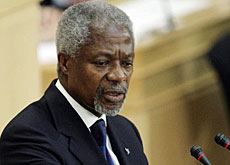
Human rights get a fresh chance in Geneva

The inaugural session of the United Nations Human Rights Council has opened in Geneva with calls for real progress on protecting victims around the world.
Switzerland, involved in the project from the very beginning, said it would continue to work to ensure the council is more effective than the highly politicised commission it replaces.
The new UN Human Rights Council is a “great new chance” for the global body to renew its struggle for human rights, the organisation’s secretary-general, Kofi Annan, said on Monday.
Annan told the opening session of the council that it should avoid the political point-scoring of its discredited predecessor, the Human Rights Commission.
“This council represents a great new chance for the United Nations and for humanity, to renew the struggle for human rights,” he added. “I implore you, do not let the opportunity be squandered.”
The now-defunct Human Rights Commission was discredited in recent years because some countries with terrible rights records used their membership to protect one another from condemnation.
“Never allow this council to become caught up in political point-scoring or petty manoeuvre,” Annan said. “Think always of those whose rights are denied.”
The UN secretary-general warned that the council needed mature leadership to inspire cooperation and commitment, rather than the confrontation and distrust which dominated the final years of the commission.
The Office of the UN High Commissioner for Human Rights says the council should “build on the recognised strengths of its predecessor and flesh out the features that make it a stronger and more effective human rights body”.
Fears remain however that the council may prove just as toothless as the commission it replaces as nations accused of rights violations keep their seats.
Cuba, Saudi Arabia, China and Russia all won seats despite their poor human rights records, although others – notably Iran – were defeated.
“There are countries on the council that have pretty bad human rights records,” said an Amnesty International spokesman. “But the council has to reflect UN membership. They reflect the reality of the world.”
Swiss Foreign Minister Micheline Calmy-Rey described the situation as an “immense task”.
“This event gives cause for much hope, but a lot remains to be done to make this council really efficient and effective,” she said.
Swiss role
Calmy-Rey said Swiss diplomacy would continue to play a role in the project and saw Switzerland as “giving boosts and providing ideas”.
She added that she hoped that the new council would have a direct impact on people’s lives.
The Swiss are preparing a document on the new institution’s operating procedures, including how it should carry out human rights reviews of all 191 UN member states and how often.
This is set to be discussed at a conference in Lausanne on August 28.
The Swiss foreign ministry has also announced other initiatives to ensure Geneva remains the global capital for human rights.
For example, Switzerland will assume responsibility for part of the expansion of the Office of the UN High Commissioner for Human Rights, whose budget and staff are doubling.
Switzerland will also provide offices for the 35 countries that do not have permanent missions in Geneva. To date, 15 countries have taken advantage of this.
For his part, Blaise Godet, Switzerland’s ambassador to the UN in Geneva, underlined that the 47 countries elected to the council on May 9 have until June 2007 to sort out all the operating procedures.
Risk
But Adrien-Claude Zoller, president of the non-governmental organisation (NGO) Geneva for Human Rights, says negotiators have their work cut out.
“By discussing the council’s entire set of operating procedures regarding human rights, the international community risks weakening them,” he said.
Zoller added that those countries resistant to progress regarding civil and political rights were a millstone around the neck of the council and that recent informal discussions did not bode well.
One of Zoller’s greatest fears is that NGOs will be marginalised. “For years states have been looking to reaffirm their position at the heart of international authorities – to the detriment of civil society.”
swissinfo, Frédéric Burnand in Geneva
Switzerland was elected to the Human Rights Council with a three-year mandate on May 9. The vote took place at the UN General Assembly in New York.
The mandate can only be renewed once. Switzerland must then cede its place to another country from the western group, before being able to stand for election again.
On Monday, Swiss ambassador Blaise Godet was chosen as the vice-president representing the seven-nation western group.
At the second session in September, Switzerland will present a universal index of human rights containing more than 1,000 documents on how to run the new body.
The Human Rights Council is sitting for the first time in Geneva from June 19-30.
The council will meet at least three times a year for no less than ten weeks, and can convene emergency sessions. Its predecessor, the Human Rights Commission, met for just an annual six-week session.
Much of the initial two-week session of the 47-state body will be devoted to planning future work, but its chairman, ambassador Luis Alfonso de Alba of Mexico, has set aside time for examining current rights crises around the world.

In compliance with the JTI standards
More: SWI swissinfo.ch certified by the Journalism Trust Initiative



























You can find an overview of ongoing debates with our journalists here . Please join us!
If you want to start a conversation about a topic raised in this article or want to report factual errors, email us at english@swissinfo.ch.